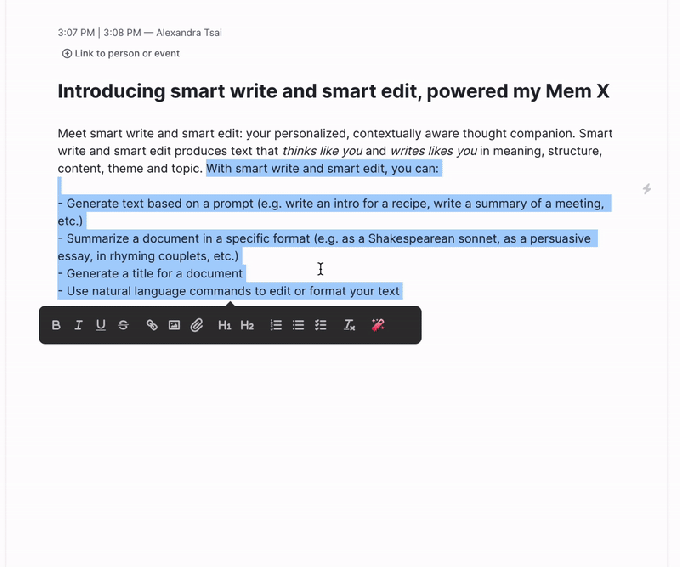Last year, OpenAI announced the OpenAI Startup Fund, a tranche through which it and its partners, including Microsoft, are investing in early-stage AI companies tackling major problems. Mum’s been the word since on which companies have received infusions from the Fund. But today, the OpenAI Startup Fund revealed that it led a $23.5 million investment in Mem, a work-focused app that taps AI to automatically organize notes.
The investment values Mem at $110 million post-money and brings the startup’s total raised to $29 million.
Co-founded by Kevin Moody and Dennis Xu, Mem differentiates itself from traditional note-taking apps by emphasizing “lightweight organization,” in Moody and Xu’s words. The workflow revolves around search and a chronological timeline, allowing users to attach topic tags, tag other users and add recurring reminders to notes.
Mem users can capture quick notes, send links and save images from anywhere using SMS, messaging apps and the platform’s mobile client. Collaboration features let teams share, edit and comment on notes and directly attach them to shared calendars for faster reference.
Mem’s search experience uses AI to search across notes, aiming to understand which notes might be most relevant in a given moment to a particular person. Moody and Xu say the platform is designed to augment knowledge workers in their typical responsibilities, like reading through pages of information, extracting the pieces relevant to a particular question and transforming the information into an answer or a report.

There’s no doubt knowledge-seeking tasks are time-consuming. According to Gartner, professionals spend 50% of their working hours searching for information and on average take 18 minutes to locate a file (albeit the veracity of metrics like these has been challenged over the years). One source estimates that document disorganization costs businesses $3,900 per employee each year in productivity losses, making Mem an attractive proposition if the tech works as advertised.
“The number one thing we hear from the organizations we talk to is the desire to be able to marry their vast troves of proprietary knowledge with … generative AI models — to support use cases that range from conducting research to writing to selling and beyond,” Moody and Xu told TechCrunch in an email interview. “The magic of Mem is that we bring together your own private and proprietary data along with state-of-the-art generative language models to unlock truly personalized, factual outputs. We combine knowledge sources across the individual, team and organizational levels, leading to significantly better performance across the board.”
Mem recently launched Mem It for Twitter, which allows users to save threads, get AI-generated summaries of their contents and see suggestions for similar tweets. It’s also continuing to refine Mem X, Mem’s built-in work assistant, with new features like Smart Write and Smart Edit, which leverages AI to generate text based on a prompt, summarize files, generate titles for documents and let users use natural language commands to edit or format text.

The plan for the foreseeable future is to increasingly lean into these sorts of AI-powered experiences, Moody and Xu say, with support from OpenAI through the OpenAI Startup Fund. OpenAI Startup Fund participants receive early access to new OpenAI systems and Azure resources from Microsoft in addition to capital.
“OpenAI is obviously leading the wave of technological revolutions that we are riding,” Moody and Xu said. “This makes the OpenAI Startup Fund the ideal partner for what we’re building — for both the technical expertise and strategic guidance they bring to the table.”
OpenAI COO Brad Lightcap, who also manages the OpenAI Startup Fund, added in an emailed statement: “Mem uses powerful AI to make knowledge workers more productive by removing the tedium and drudgery of organizing and accessing information, ultimately allowing people to focus on the parts of their work that matter. Their vision aligns squarely with our goal at the OpenAI Startup Fund to accelerate companies using AI to enhance productivity and, more broadly, human potential.”
Mem competes with a number of companies seeking to tackle the same knowledge-finding and notes-organizing challenges. In enterprise search, there’s Glean, which recently raised $100 million in a venture equity round. On the knowledge management side, Atlassian’s wiki-like collaborative workspace Confluence and Notion, which was valued at $10 billion in 2020, still dominate.
But Moody and Xu argue that 16-employee Mem has an advantage in that it’s “self-organizing,” ostensibly resulting in less manual curation and labor. While they declined to reveal Mem’s revenue or the names of any major customers, they assert that Mem is successful, owing to its AI-driven tech.
“We’re confident in our unique approach to self-organizing and generative knowledge management. … Our personalized machine learning models not only help knowledge workers stay organized automatically, but also go beyond simply helping find things — we actually help people do their work,” Moody and Xu said. “The shift to remote work has made effective, asynchronous knowledge sharing more important than ever, and the market slowdown has caused companies to focus on efficiency. Our AI-assisted knowledge work saves people time, and the rapid improvement in large language models gives us a further tailwind.”































Comment